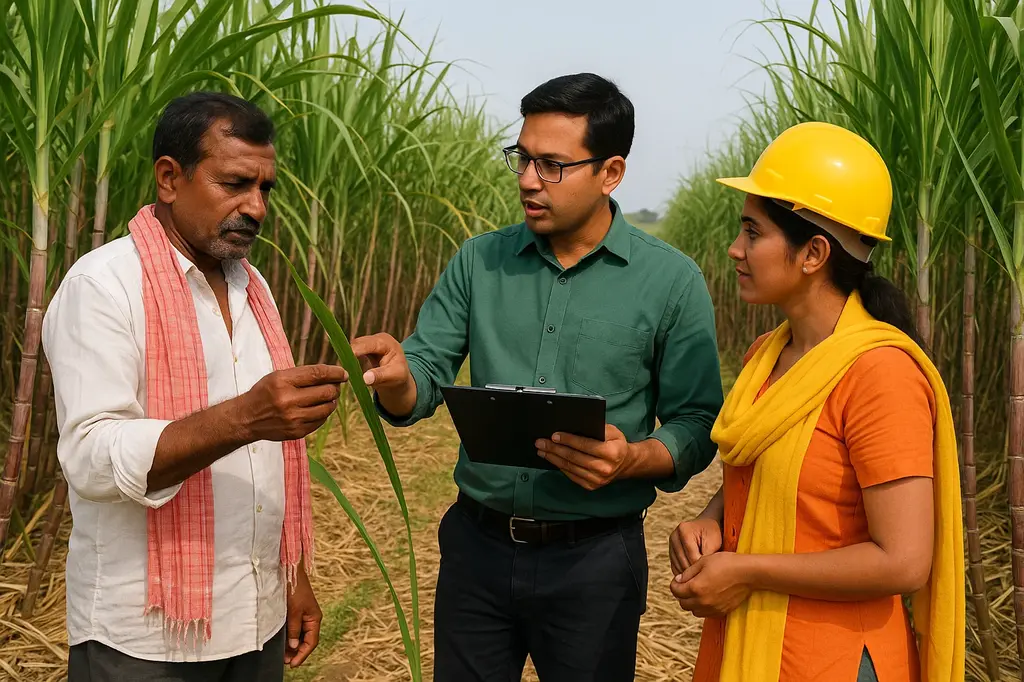In a new collaborative step aimed at addressing the evolving challenges of sugarcane farming, the Indian Council of Agricultural Research – Indian Sugarcane Research Institute (ICAR-ISRI), based in Lucknow, has entered into a formal agreement with Zuari Industries Pvt Ltd (ZIL). The two entities signed a memorandum of understanding (MoU) for the launch of a “Cane Excellence Programme” at Gobind Sugar Mills in Aira, located in the Lakhimpur district of Uttar Pradesh.
The initiative, although still in its early phase, is intended to focus on improving sugarcane productivity, encouraging sustainable practices, integrating scientific research into the field, and involving farmers more deeply in the agricultural process. The MoU formalizes the respective roles both the research institute and the industry partner will play in this engagement.
Focus on Region-Specific Solutions
The partnership highlights a deliberate shift toward place-based solutions rather than one-size-fits-all methods for crop improvement. Uttar Pradesh, being one of the leading sugarcane-producing states in the country, has long been a focal point for such interventions. With its fertile land and large base of smallholder farmers, the state presents both opportunities and persistent hurdles in sugarcane farming — from inconsistent yields to changing climate patterns.
Under the terms of the MoU, ICAR-ISRI is expected to play a central role in providing scientific guidance and technical expertise. This includes offering agronomic advice tailored to local needs, identifying and evaluating both existing and emerging sugarcane varieties, and assisting in the development of new varieties better suited to regional conditions.
In addition, ICAR-ISRI will send scientists and agricultural experts to the field for training sessions, assist with ongoing monitoring of programme outcomes, and share research updates that can influence field-level practices. Their involvement extends to creating technical documents, videos, and advisories — with some of these expected to be disseminated through mobile-based platforms for better farmer access.
Industry and Research Collaboration on Practical Challenges
The collaboration also reflects a growing trend where private sector entities seek partnerships with public research institutions to address practical, long-standing issues faced by farmers. Zuari Industries, which owns and operates Gobind Sugar Mills, is engaging with ICAR-ISRI not just as a funding partner but as an active stakeholder in implementing strategies derived from research insights.
Zuari’s Executive Director and Unit Head at Gobind Sugar Mills, Alok Saxena, emphasized the intent behind the programme as being one of support and shared learning. While speaking through an official media release, he noted that the programme’s success would lie in how well it manages to reach and benefit sugarcane farmers, especially in terms of yield improvement and income stability.
ICAR-ISRI Director R Viswanathan pointed out the potential value of aligning academic and field-based knowledge. According to him, working in tandem with the sugar industry can allow research bodies to refine their scientific approaches based on real-world field conditions, making their solutions more practical and actionable for farmers.
Digital Tools and Knowledge Sharing on the Agenda
One of the key elements of the agreement is the inclusion of digital tools and data-driven advisory services in the Cane Excellence Programme. The aim is to integrate decision-support systems that can assist farmers in making timely and informed choices regarding their crops.
This digital angle may involve using platforms that send mobile alerts on weather, soil conditions, or irrigation schedules, alongside more structured tools to monitor farm performance and suggest corrective action. By bringing such innovations closer to the field, the programme could enable farmers to move toward more predictable and manageable crop cycles.
The agreement also includes provisions for exposure visits, where farmers or field staff may travel to other successful sugarcane regions to observe effective techniques firsthand. This type of cross-learning, while not new in concept, is being increasingly recognized for its value in encouraging peer-to-peer learning among farmers.
Also Read: Gangamai Teams Up with Mahindra to Use AI for Smarter Sugarcane Harvesting
Aiming for Long-Term, Sustainable Outcomes
According to Zuari Industries’ Managing Director Athar Shahab, the Cane Excellence Programme is part of a broader push to create stronger linkages between the research sector and agricultural industries. While speaking about the MoU, Shahab noted that such partnerships offer a chance to respond to the realities farmers face today — from erratic weather to market uncertainties — with a coordinated strategy that blends scientific knowledge with practical implementation.
Although the partnership is still in its initial stages, both parties seem to agree that long-term thinking is critical. Rather than aiming for immediate and dramatic changes, the programme is structured to focus on steady progress over time. Improving the resilience of sugarcane farming, developing climate-appropriate practices, and strengthening the overall support system for farmers are among the expected outcomes.
While this MoU represents a formal start, the ultimate measure of success for the Cane Excellence Programme will depend on how well it adapts to the challenges in the field. It also raises larger questions around how agricultural development should be approached — not only through high-level research or commercial ventures, but through continuous collaboration where farmers’ voices, needs, and observations form a key part of the process.
As sugarcane continues to remain a crucial crop for India’s agricultural economy and its rural livelihoods, partnerships like this one — rooted in science, supported by industry, and centered around farmers — may become increasingly necessary to navigate the future.


